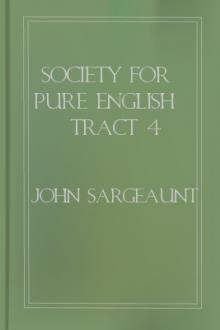Society for Pure English Tract 4
Book Excerpt
It will be seen that the Latin sounds were throughout frankly Anglicized. According to Burney a like principle was followed by Burke when he read French poetry aloud. He read it as though it were English. Thus on his lips the French word comment was pronounced as the English word comment.
The rule that overrode all others, though it has the exceptions given below, was that vowels and any other diphthongs than au and _eu_, if they were followed by two consonants, were pronounced short. Thus a in _magnus_, though long in classical Latin, was pronounced as in our 'magnitude', and e in _census_, in Greek transcription represented by [Greek: eta], was pronounced short, as it is when borrowed into English. So were the penultimate vowels in _villa_, _nullus_, _cæspes_.
This rule of shortening the vowel before two consonants held good even when in fact only one was pronounced, as in nullus and other wor

 Free Download
Free Download



















